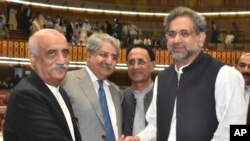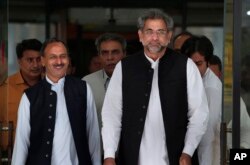Shahid Khaqan Abbasi took the oath of office Tuesday as Pakistan’s new prime minister to replace Nawaz Sharif, who was disqualified by the country’s highest court last week on corruption charges.
The 58-year-old Abbasi is a staunch Sharif ally and senior member of his ruling Pakistan Muslim League-Nawaz, or PML-N, party.
Earlier in the day, Abbasi won 221 votes in the 342-member legislative lower house of parliament, or National Assembly, which is dominated by PML-N and its allied parties.
His closest rival, Syed Naveed Qamar, from the opposition Pakistan People’s Party, secured 47 votes.
Pakistan was plunged into political uncertainty Friday when a five-member panel of the Supreme Court disqualified Sharif from holding public office. The panel forced Sharif to quit, saying he failed to disclose a monthly salary from a Dubai-based company owned by his son.
Sharif, 67, has denied wrongdoing. His previous two stints as prime minister of Pakistan in the 1990's also were cut short, and he was ousted over allegations of corruption.
Sharif’s party won the 2013 election, bringing him to power for a record third time. His latest stint was due to end in June 2018, when the next national elections in Pakistan also are due.
In a speech to parliament, Abbasi dismissed suggestions the anti-Sharif judicial verdict caused divisions in the ruling party or undermined its political credentials.
"There was no dissension in our ranks. There were no defections. The party stands united as it was… whomever the prime minister (Nawaz Sharif) named was supported unanimously," Abbasi said.
Abbasi also dismissed concerns of political and economic instability resulting from Sharif’s dismissal.
"Within four days, the democratic process is back on track,” he said.
Abbasi, however, confirmed he assumed office on an interim basis for 45 days. The ruling party wants to elect Sharif’s younger brother, Shahbaz Sharif, as the permanent successor, according to party officials.
Shahbaz Sharif, 65, is the chief minister of Pakistan’s most populous Punjab province. He is expected to contest by-elections due next month to win a parliamentary seat before he takes over from Abbasi as the country's chief executive.
Opposition parties, independent analysts and newspaper editorials have criticized the political maneuvering as dynastic and undemocratic.
In past years, political turmoil encouraged the military to stage coups to oust elected governments and seize power; but analysts say that for the first time, the judiciary has dismissed an elected prime minister on corruption charges, in a country where the powerful until now have escaped prosecution.
The judicial verdict also has triggered calls for holding other state institutions, including the Pakistan military, accountable for their actions.





